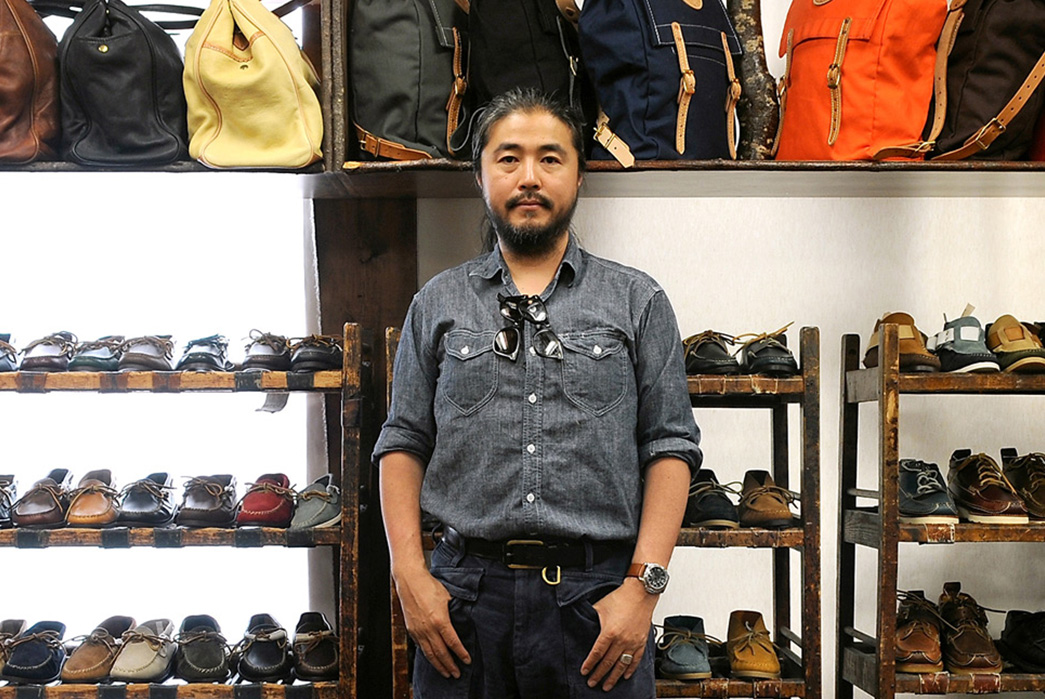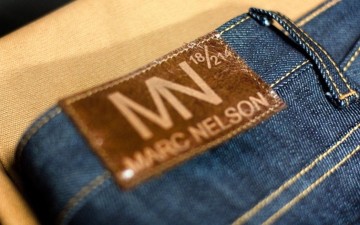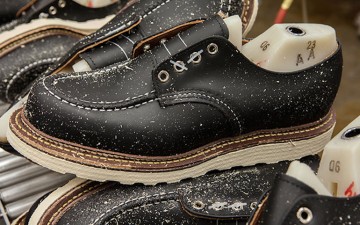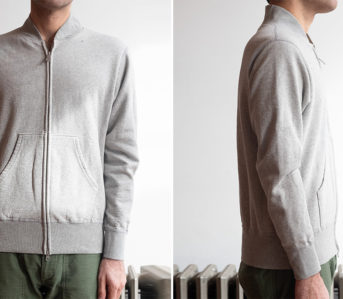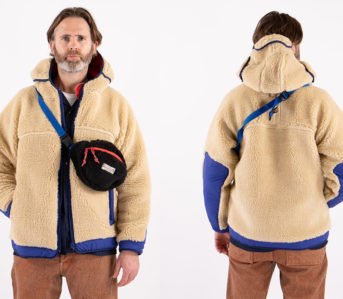Recently named as one of six men who defined Japanese style, Yuki Matsuda’s influence on style is not obviously characterized by his Japanese heritage, but instead by his unique take on Americana. There is a distinctly considered, almost slowness to the approach of Matsuda, who now calls Hermosa Beach home. After all, a pair of handcrafted Yuketens can take anywhere between 96-120 hours to make. “Uncompromising obsession with the details is the defining reason why Yuketen is the envy of the show world” states one of the brand’s adverts from 2011. And it’s easy to see why when you understand not only the manufacturing process which is alluded to by the brand’s slogan, “Handmade by Artisans”, but also Matsuda’s journey from Japan to Southern Cailifornia.
Defining Japanese Style
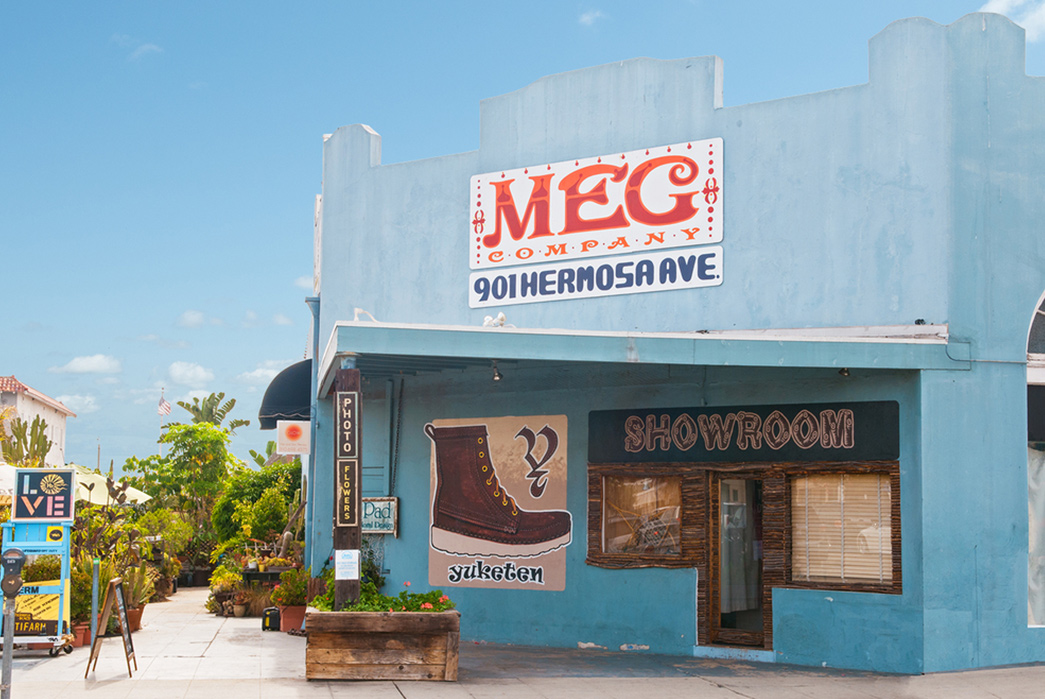
Image via Chamula.
Born in Osaka, Japan, he was fascinated with 1950s American culture from an early age. Moving to the US at a time when Japanese buyers were scouring flea markets, garage sales, and vintage stores for buried treasure from the first half of the twentieth century, Matsuda followed his passions and became involved in the Americana export business. While he may not have realized it then, his passion for American culture would ultimately shape his career and lead him to where he is today.
His appreciation for well-made garments, Native American jewelry, and surf culture led him to the California Coast, where he still resides today. But before Meg Company was a glimmer in Matsuda’s eye, he opened two clothing stores. One was focused on Patagonia, the other on sneakers and casual clothing. Matsuda recalls, “When I was a teenager and I wanted to buy a Pendleton shirt at the store, it cost me 150 bucks brand new, but if I bought used Pendleton shirts at the vintage clothing stores, it was only $35. So, I started going into vintage stores and studying more, and each time I went I would see that these Pendleton shirts had different labels depending on their age”. In an environment where detail was everything and a rising crop of Japanese entrepreneurs was studying American heritage, it is easy to see why Matsuda has come so far.
A Dream Country
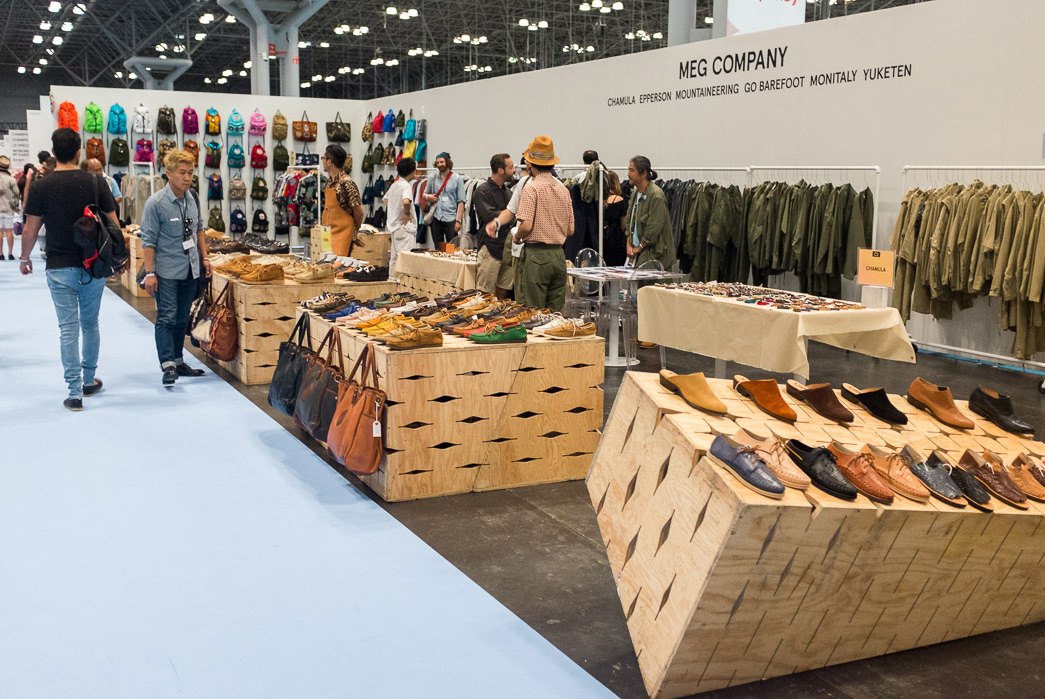
With a positively youthful fascination and obsession with history, “America was kind of a dream country,” says Matsuda. You would be forgiven for thinking that the output of Meg Company was simply a reproduction of timeless or classic garments from the heritage playbook. But Matsuda’s vision is far more than that; “We value our heritage but understand that in order to break boundaries and create innovative products, we can’t just play by the rules of tradition,” he says.
His brands range from North America’s native craftsmanship to New England’s sporting tradition. Chamula, Epperson Mountaineering, Monitaly and Yuketen all re-create archival designs and combine with Yuki’s very distinctive and directive vision of contemporary clothing. We’re going to look at the history of the Meg Company umbrella and the brands which have gained great popularity and allure in the post-heritage menswear world.
Yuketen
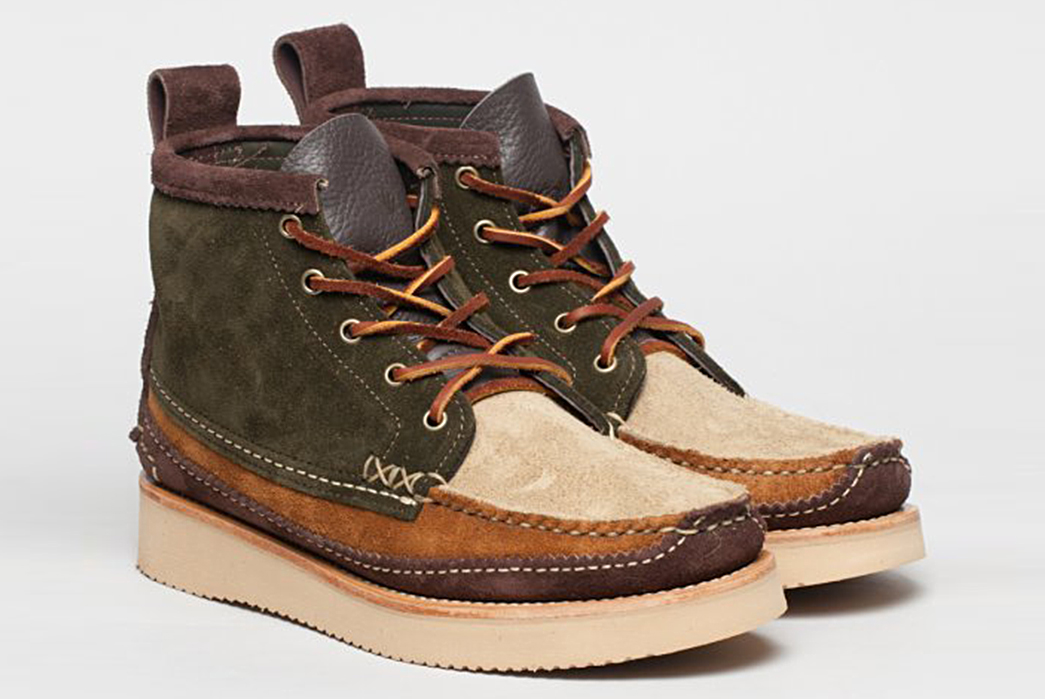
Image via Norse Store
Yuketen was founded in 1989 as a brand focused on high quality and handmade moccasins. Inspired by the iconic silhouette as much as the mystique of the manufacturing process in the North East of the United States, Matsuda has built the brand into an all-encompassing footwear and accessory range. The distinctive use of unexpected fabrics sets the brand apart and Matsuda feels like Yuketen shouldn’t be too much of a convenience. From the beginning the brand’s main market was Japan, but they are now stocked worldwide in a number of recognized stores such as Unionmade and The Bureau.
Prior to the heritage boom of the late 2000s, Matsuda openly admits that Yuketen was a “very small business, really only Japanese buyers understood what I made at the time”. One of the first and best customers in those early days was Beams and although support in Japan was paramount to the brand’s early success, it is clear that manufacturing and basing the brand there wouldn’t have worked. Matsuda spent copious amounts of time in Maine—the mecca of handmade footwear in the US—hunting down artisan shoemakers and studying time-honored production techniques.
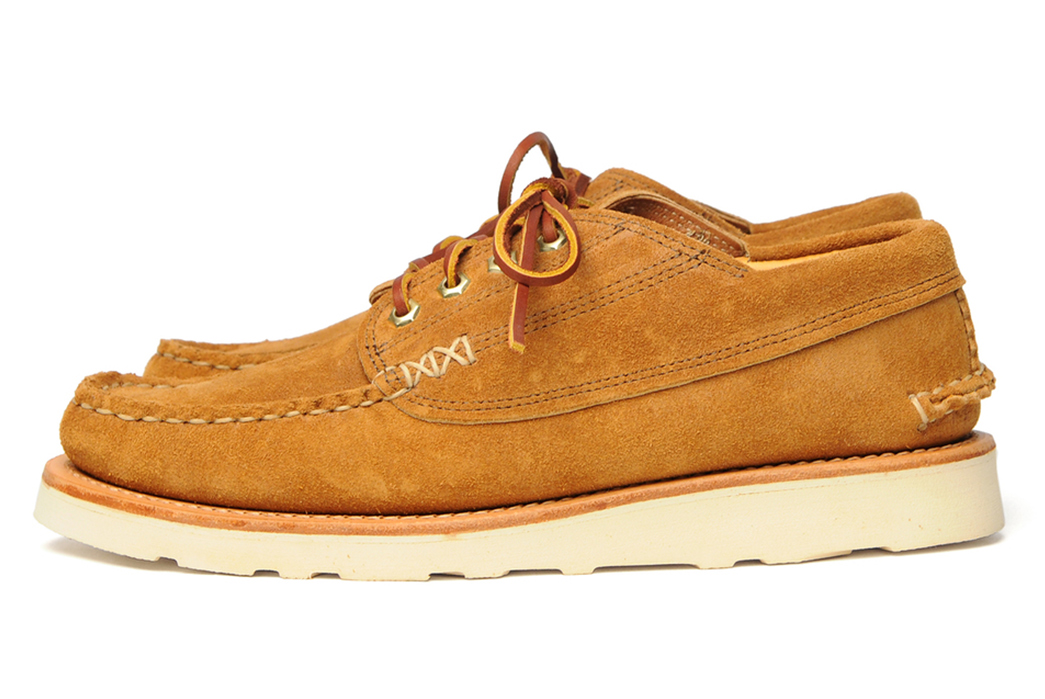
Image via Yuketen.
Matsuda credits Horween Leather and Quoddy as early supporters of his work and a huge source of inspiration. Even the name Yuketen pays homage to this relationship and is an amalgamation of Yuki, Kevin and Kirsten (from Quoddy). The designer is very honest and open about this, stating that his work is “about the knowledge gained through learning experiences with many great people I’ve met in my life”.
Matsuda was soon able to setup his own factory in the US and employ hand sewers who had decades of combined experience. While some Yuketen models take obvious cues from designs of the past, the finished product is very much the consequence of the designer. Matsuda’s obsession with quality and time-honored silhouettes, combined with more adventurous designs, produces a product which is truly unique. Yuketen may reintroduce models from season to season, but it is clear that the brand is always developing. A number of models may also not be made again, making some variants very collectable and in high demand by fans of the brand. For example, take the recently released 3sixteen 15 year anniversary collaboration; the hand-dyed indigo Rocker Ox which combines the look of a traditional Blucher moccasin and a Vibram rocket sole which is custom made for Yuketen.
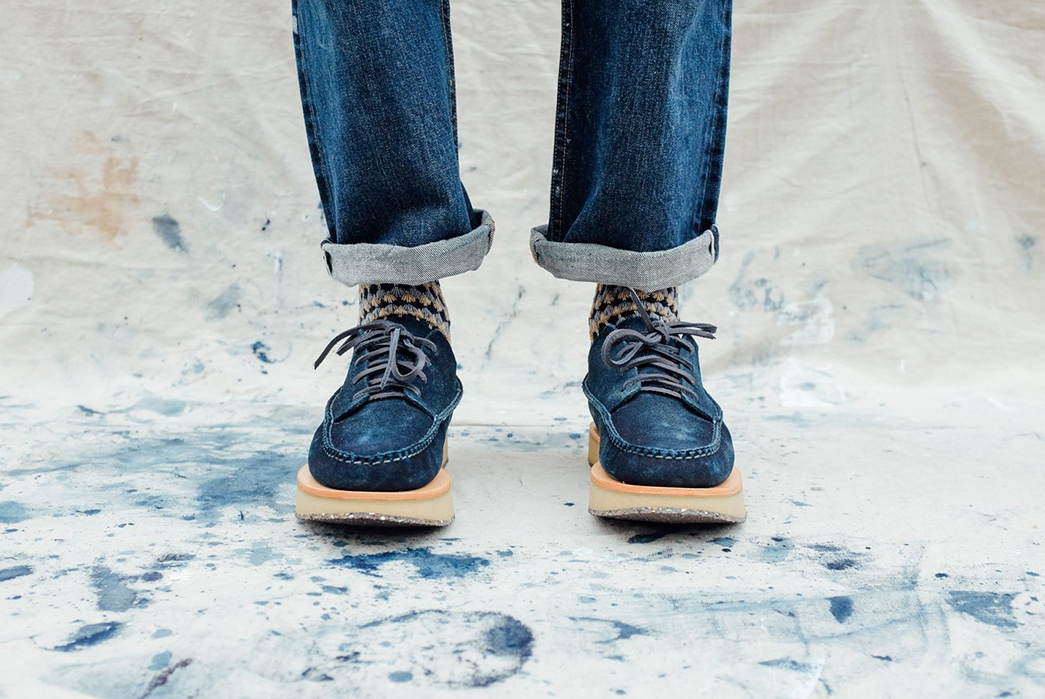
Image via 3Sixteen.
Epperson Mountaineering
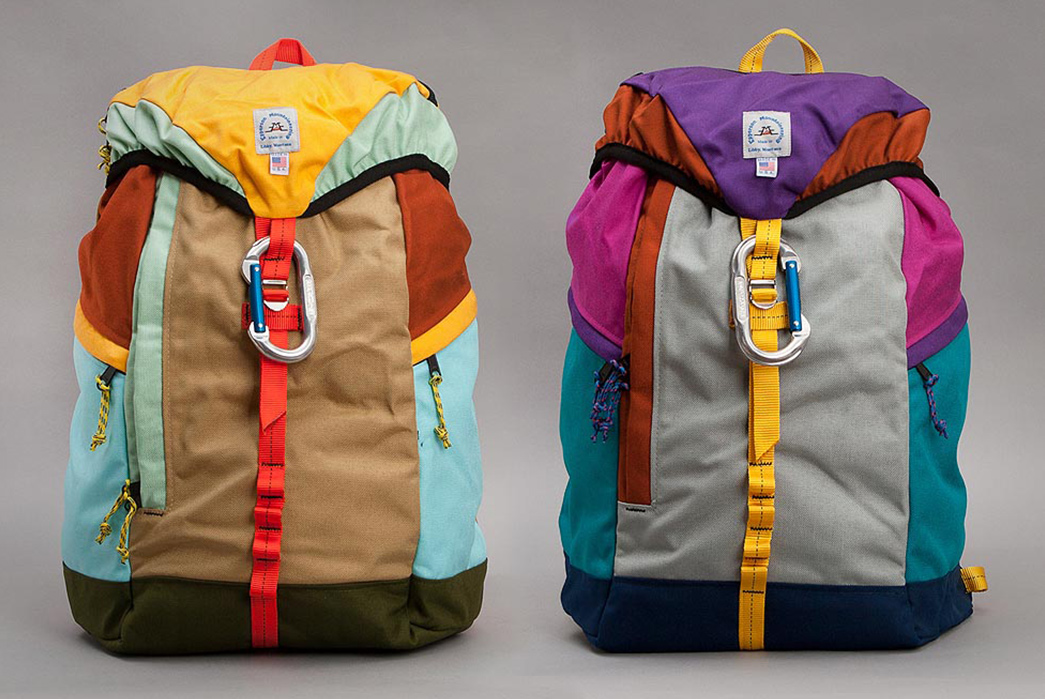
Image via Lumberjac.
For many designers and footwear aficionados, one brand with so much depth and prestige would likely be enough. But not for Matsuda. Reflective of his seemingly never-ending passion for American heritage, another brand which comes under the Meg Company umbrella is Epperson Mountaineering. Originally founded by Mark Epperson in 1973, an established climber and outdoorsman, Epperson Mountaineering reproduces iconic pieces of outdoor luggage from a golden era of climbing.
Mark’s vision back then is the same as it is today; he couldn’t find a backpack which satisfied the demand for high-quality materials and performance. In order to make the ‘perfect backpack’, Epperson ambitiously started a quest to find the best materials and hardware which would stand up to the task of the modern mountain climber. Today, all Epperson Mountaineering packs are still made in the USA. Combining the best materials, including 1000 denier Cordura, YKK Zippers, mil-spec or Indian / oval pattern webbing and reinforced seam-sealer inner compartments for durability, Epperson products are as suitable for city slick commuters as they are climbers heading to Joshua Tree.
Monitaly
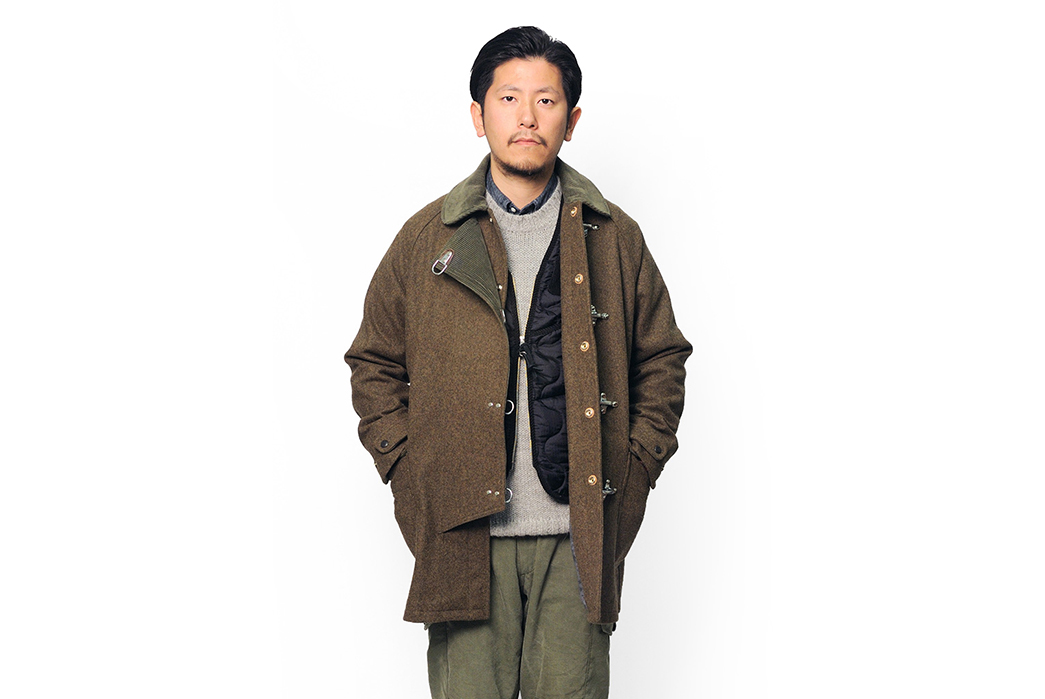
During Matsuda’s many years of dealing in American vintage clothing, he noticed that the fit was “funny” on a number of vintage garments; a jacket was too short or a trouser was too wide. Matsuda would alter vintage examples to achieve the desired fit, but he eventually decided to make his own garments.
In 1995, Monitaly was born on the same principles which had guided Yuketen since the late-1980s. Monitaly channels a wide variety of Americana influences from military, to workwear, to athletic garments and even Mexican ponchos. The brand also released a collection of items that re-purposed Korean War era US Army tent fabrics. Matsuda feels that the fit and construction of Monitaly is the real USP of the brand and modestly says that the fabrics are “great, too”.
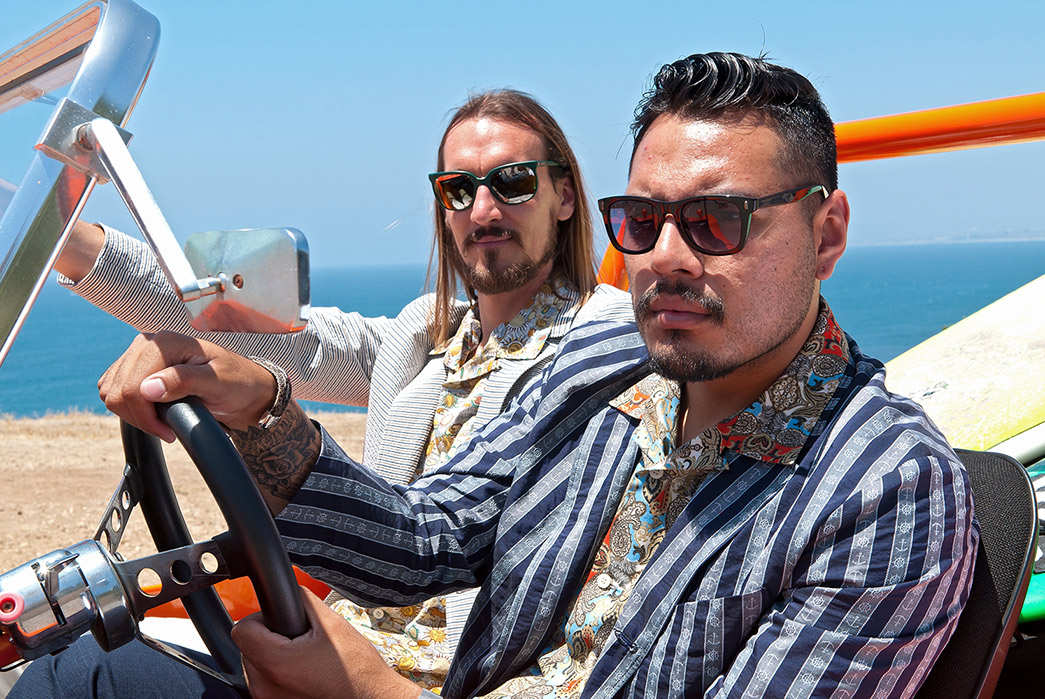
His passion for the outdoors isn’t just on the surface, and Matsuda regularly wears Monitaly when going fishing or hiking. And while the garments of undoubtedly of high-quality, there is still a playfulness and good nature to the offering. The result is a collection of garments that reflects Matsuda’s knowledge, experience, and humble nature. But Matsuda is adamant that Monitaly isn’t a heritage brand. Even though it may appear there are design principles which are akin to a vintage military field jacket or hunting coat, the ideas very much stem from ‘ideas in my mind’ according to Matsuda.
Chamula
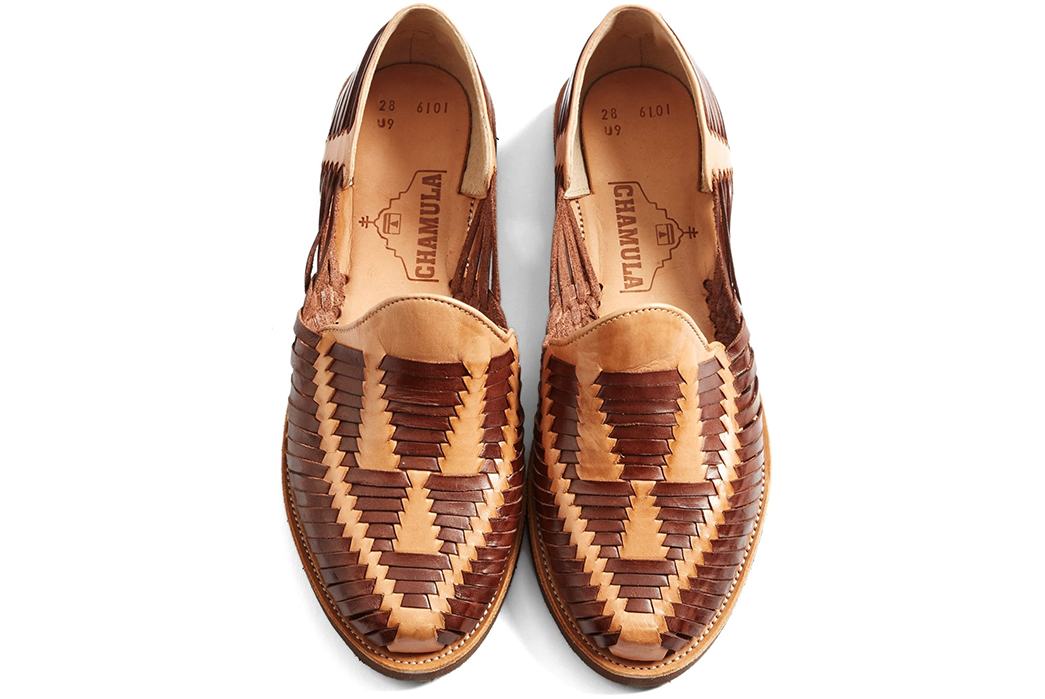
Image via Nordstrom
Chamula strives to preserve the art of delicately-made goods in the highlands of Mexico and references Matsuda’s extensive travels throughout the region in the 1990s. In the constant search for artisan makers and producers, the brand champions hand-made knitwear including cardigans, hoodies, headwear, and scarves. These are complemented by delicately crafted and colorful accessories including braided horsehair bracelets decorated with the nickel buttons and conches.
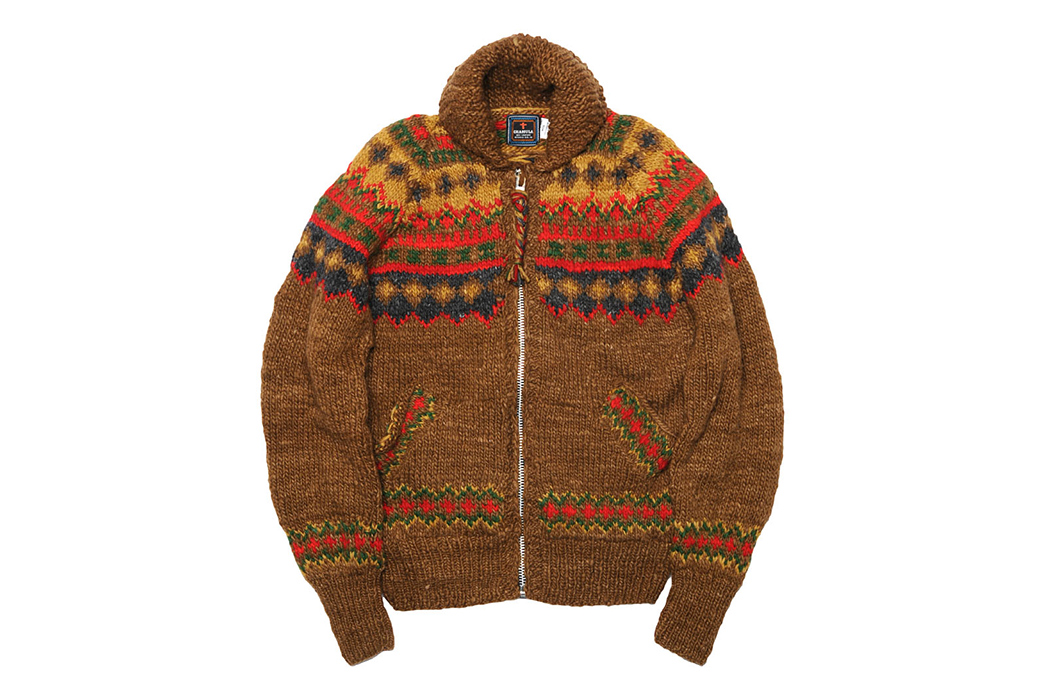
While Yuketen is the primary footwear outlet of Meg Company, Chamula is equally as well known for its line of huarache footwear. Made from vegetable tanned leather which results in a supple, breathable and high-quality piece of footwear, they are decoratively adorned with traditional Mexican embellishments. These are products which have a distinct richness and soul embedded with their construction, with the knitwear made by the same pair of hands from start to finish.
Iconic Products
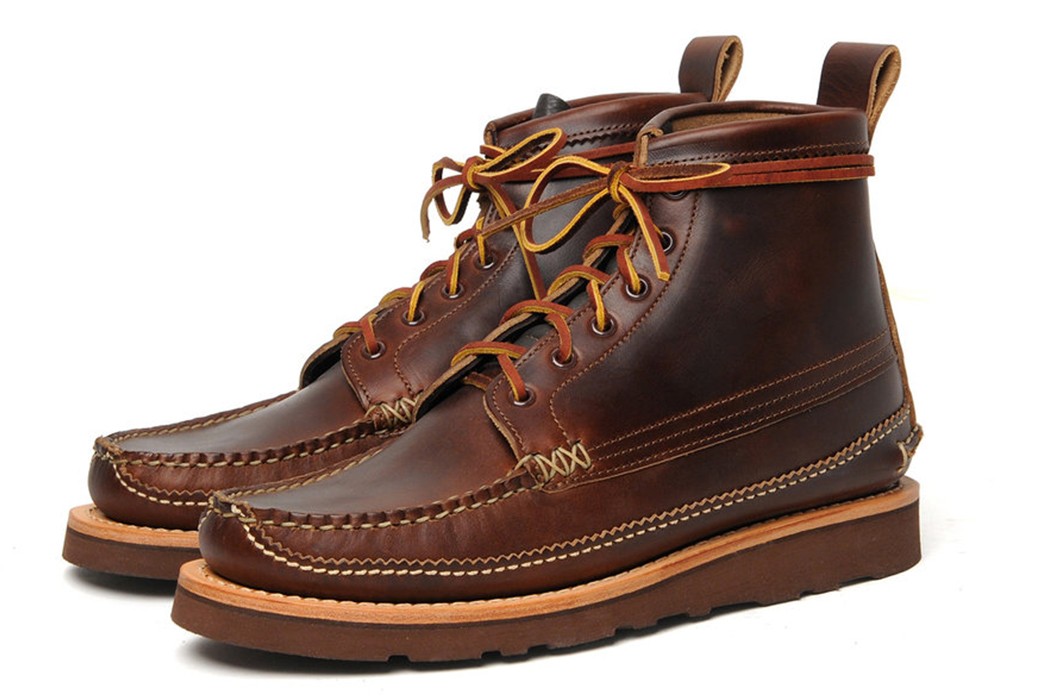
Image via Yuketen
Yuketen Maine Guide 6 Eye DB Boots
The Yuketen Maine Guide has long been a staple of the brand’s offering and has seen a number of incarnations utilizing various materials and colors. Drawing inspiration from the early wilderness guides of New England, each shoe is hand stitched in Yuketen’s Maine factory from vegetable tanned leather. With genuine moccasin construction and a hand-sewn plug, overcast and heel. The Maine Guide also comes fitted with a Vibram Cristy or 2021 sole. The Maine Guide is quite easily a contender for your newest irreplaceable shoes.
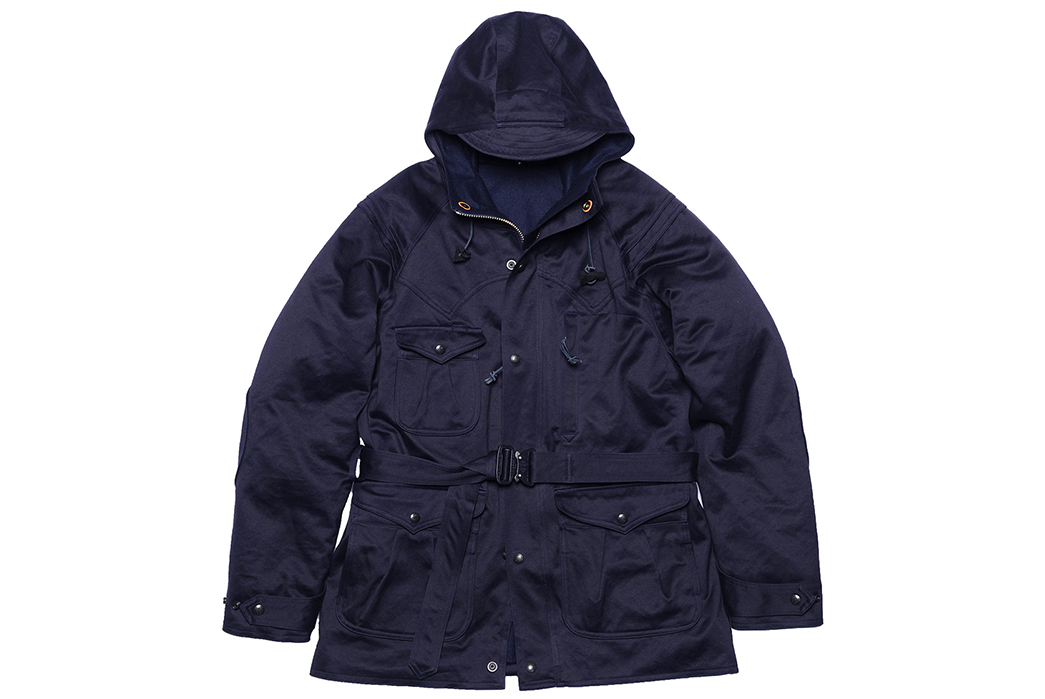
Image via Monitaly
Monitaly Mountain Parka
The iconic Mountain Parka is another consistent offering of the Meg Company line-up. Made from an American waxed cotton shell with a wool lining, the garment has raglan sleeves, a western yoke, internal and external pockets, elbow patches, a COBRA quick release buckle and features double needle construction. It is also worth noting that the parka boasts the brand’s exclusive Vancloth & Sons fabric. For a tried and tested, reliable, and good looking garment to see you through the winter months, you can be confident that the Mountain Parka houses some of the best details Matsuda has seen in a plethora of vintage garments.
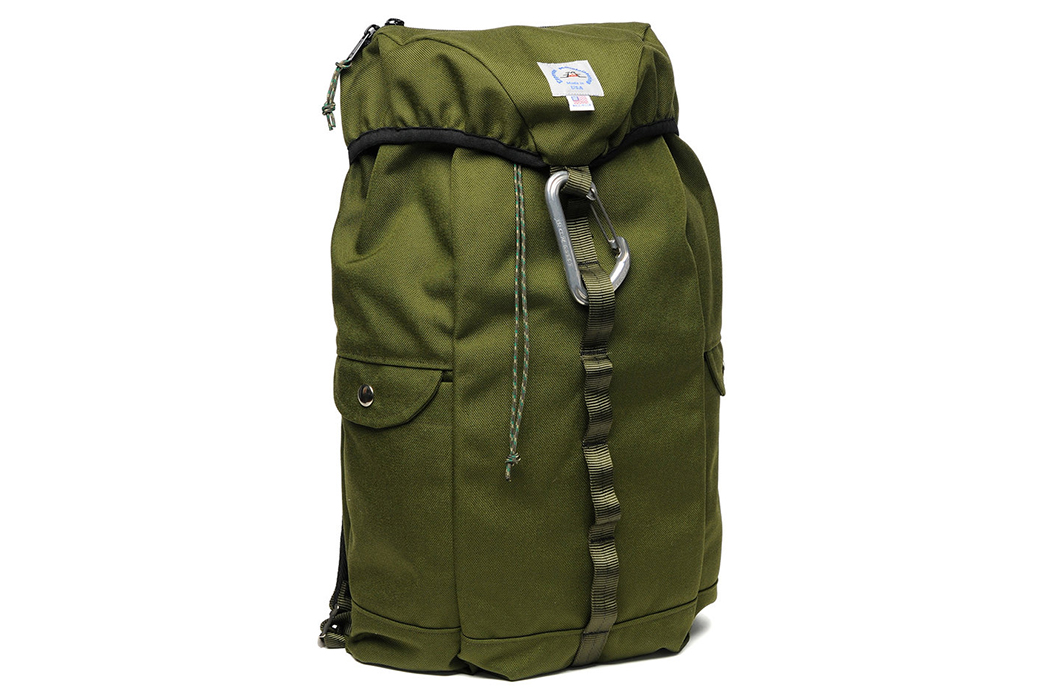
Image via Epperson Mountaineering
Epperson Mountaineering Climb Pack
The climb pack is a rock steady backpack made from DWR-coated 1000 denier Cordura fabric with an internal laptop sleeve, military-grade tubular nylon webbing, climbing spec drawcords and zipper cords, as well as breathable shoulder straps and multiple loop ‘daisy chain’ webbing. Available in a variety of colorways, the Climb Pack harkens back to Mark Epperson’s desire to build the ultimate backpack which could stand up to the elements of Libby, Montana and further afield.
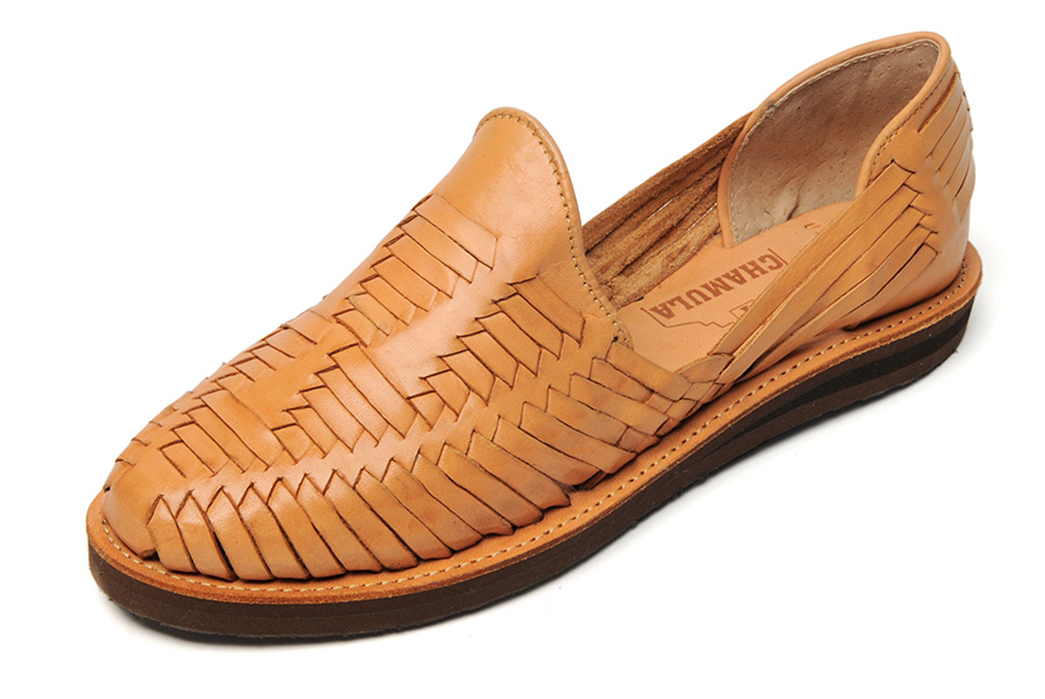
Image via Chaumla
Chamula Cancun
The Chamula Cancun is a closed toe sandal with a low profile, minimal silhouette and delicate woven upper made from veg-tanned leather. The standard model is in line with a longstanding tradition of using recycled tires for huarache soles, but crepe soles are also available. Soft, breathable and something which would undoubtedly be a hit with Jeff Bridges’ ‘The Dude’, you can be certain these combine comfort and style in equal measure.
Going back to 1989 when Matsuda left his job as a vintage buyer, his wife Megumi loaned him the money to start Meg Company (the company is her namesake). With no employees, a single client and occasionally a booth at The Rose Bowl, Matsuda ran the company out of his apartment in the beginning. He recalls that in those early days you didn’t know whether you would make money or not. Living day by day, Matsuda stuck the path and continued to build on the vision he had created.
The situation has since improved and Matsuda’s product graced the shelves of an increasing number of stores, but in 1997 Meg Company almost went bankrupt due to financial mismanagement. Having to sell off portions of his vintage collection and close stores in Hermosa Beach, it was a trying time for the Osaka born visionary. But financial wellbeing was regained years later and Matsuda once again weathered the storm and came out the other side strong and with renewed vision. As 3sixteen commented, Yuki Matsuda is a man fueled by a love of high-quality products and an unending desire to improve his brands’ offering, year-in, and year-out. Almost 30 years after it’s inception, the offering of Meg Company continues to go from strength to strength with respect, dignity, and character.
